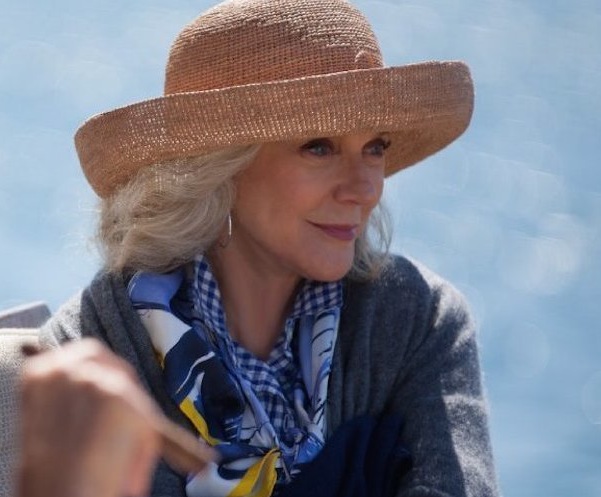Film Review: “I’ll See You in My Dreams” — Highly Pleasurable
Happily, Blythe Danner is the central figure in an immensely pleasurable indie film that blends the integrity of an art film with the cozy accessibility of the mainstream.
I’ll See You in My Dreams, directed by Brett Haley. At Kendall Square Cinema and other New England movie houses.

Blythe Danner in “I’ll See You in My Dreams.”
By Betsy Sherman
Here’s a phrase that’s been a long time coming: “Hey, let’s go see a Blythe Danner movie.” Probably not since the 1974 romantic triangle saga Lovin’ Molly has it even been relevant. The sublime actress, who has found fulfillment on stage rather than screen, is best known as the mother-in-law of Ben Stiller in the Meet the Parents movies and, in real life, the mother of Gwyneth Paltrow. Happily, she’s now the central figure in I’ll See You in My Dreams, an immensely pleasurable indie film that blends the integrity of an art film with the cozy accessibility of the mainstream.
Directed by Brett Haley, with a script by Marc Basch and Haley, I’ll See You in My Dreams captures a series of transitions in the life of a well-off southern Californian woman in her seventies. Carol (Danner), a retired teacher, lives in the house she shared with her attorney husband, who died 20 years earlier in a plane crash. Her daughter lives in New York. Carol’s female friends (played by Rhea Perlman, Mary Kay Place and June Squibb), who gather for card games and such, live in a retirement community that has a golf course and a full roster of activities. They want her to move there, but Carol doesn’t see any advantage in giving up what she has just to be closer to more seniors.
The quiet routines of Carol’s life are presented in a montage: she rises early, tends to her garden and her house, sips some white wine, all the while accompanied by her sweet old yellow lab. The dog’s death brings an element of uncertainty into her world, and opens the door for new companions both two- and four-legged. She reaches out to Lloyd (Martin Starr), the replacement for her old pool guy, to catch a rat skittering through the house. While he’s a washout as a rat-catcher, and about as self-deprecating a conversationalist as one can be, the young man reveals other worthy qualities. He’s an aspiring songwriter who lived in Austin after graduating from college but has moved back in with his mother. Carol tells him that before she married, she was a folk singer in Greenwich Village. Lloyd is intrigued, and invites her, with charming awkwardness, to go to a local karaoke bar.
Meanwhile, a Texan newcomer to the retirement community has been flirting with Carol. After having participated in a comically disastrous speed dating event (the men are dire, but Carol’s aloofness doesn’t help), they cross paths again and Carol finally flirts back. Something is shifting within. Carol calls Lloyd and asks if they can go to karaoke that night. She takes the stage wearing a sexy trench coat and confidently sings the old doused-torch song “Cry Me a River.”
The Texan, whose name is Bill, just like Carol’s husband, is played by that laid-back locomotive of masculine energy, Sam Elliott. Sure, these two are more attractive than most in their age group, but the film doesn’t leave things skin-deep. Bill sees his retirement as a chance to expand rather than contract experience. He sees something in Carol—although we’re not yet sure about it—that makes him think she can take a leap as well.
The film is beautifully shot by Rob Givens using plenty of natural light. An attention to the mundane details of Carol’s daily routine suggests the rigor of some East Asian cinema. Many of the scenes between Carol and Bill take place on his boat, and Danner shimmers as she enacts Carol’s thaw. The liveliness of the girl-talk scenes gives the movie an occasional energy boost. For the most part, they’re fun, but the sequence where the ladies get zonked on medical marijuana and go to the market on a munchies run brings things too close to those movies about the cutesy-poo elderly that are invariably set in Florida.
I’ll See You in My Dreams is Danner’s movie, for sure; however, its anchor is the touching and dryly funny performance by Starr. Although he’s done plenty of movies and television shows (Silicon Valley) since, I may always think of Starr as the valiantly dorky Haverchuck in Freaks and Geeks. Lloyd, discouraged and embarrassed by his failure to launch, seems to hope that Carol can pull him out of his funk (similar to the way Bill can pull Carol into new territory). When Danner is on stage singing, Starr gets this great look of pride on his face, like, hey, I helped make this moment possible. But Lloyd doesn’t always find Carol at her best: he shows up when Bill’s there, and it’s a blow when Carol introduces him as her pool guy, not as her friend. Their bond is a refreshing feature in this story about a woman who, while trying to avoid complications, benefits from letting some volatility into her life.
Betsy Sherman has written about movies, old and new, for The Boston Globe, The Boston Phoenix, and The Improper Bostonian, among others. She holds a degree in Archives Management from Simmons Graduate School of Library and Information Science. When she grows up, she wants to be Barbara Stanwyck.
